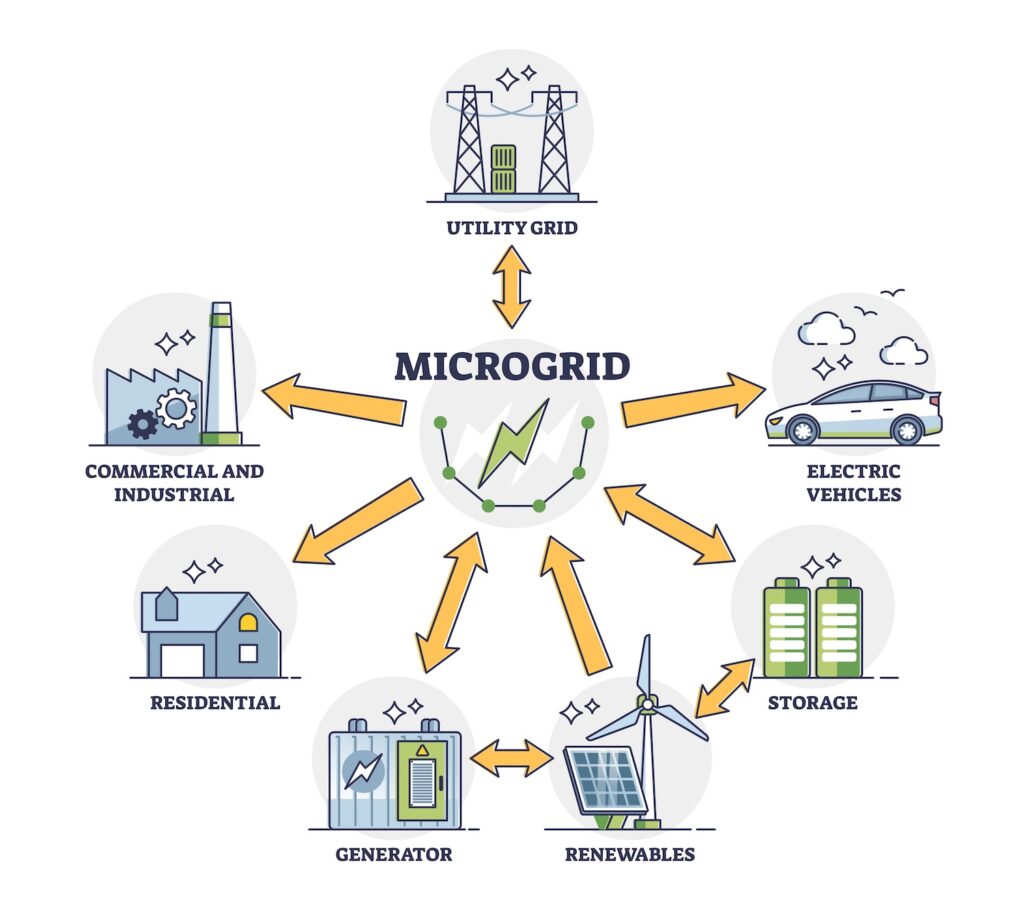
A microgrid is a localised electrical system that operates independently or in coordination with the main power grid.
It consists of distributed energy sources, such as solar panels, wind turbines, and energy storage devices, along with various loads and power management capabilities.
The primary purpose of a microgrid is to provide reliable and resilient power supply to a specific area or community.
Microgrids can be implemented in a variety of settings, including:
- Small islands — where it may be impossible to connect with a main power grid. Although many populated islands may already have a microgrid in the form of traditional generator power, adding renewable energy technology is now providing greater options for these communities.
- Remote areas — where providing connection to the main power grid may be technologically difficult or cost prohibitive, or where communities may benefit from the independence gained from a microgrid. Remote areas may have systems that are connected to the main grid, but which can be islanded. This greater flexibility provides independence, decreased costs and energy reliability.
- Military bases — where uninterrupted power delivery is paramount. The capacity to utilise diverse energy generators means a military base is not fully reliant on fuel deliveries. Independent control over power supply and delivery ensures critical operations can be maintained.
- Commercial buildings — such as shopping centres, hotels and office blocks. Having a microgrid ensures greater self-sufficiency, reduced costs, improved reliability and overall operational efficiency.
- University campuses — where one of the most interesting benefits is the ability to provide learning opportunities. When microgrids are used at university campuses the benefits and challenges can be observed in a practical setting.
- Industrial parks — where machinery may be operating, and large numbers of workers rely on energy delivery. Microgrids offer businesses the reliability of controlled, self-managed energy production and distribution to ensure production lines and manufacturing processes remain free of power outages, causing down time and loss of income.
- Hospitals, nursing homes, care centres — where energy autonomy is vital to ensure uninterrupted care.
- Research facilities — where reliable energy delivery is critical. Grid independence and resilience is important to ensure uninterrupted supply when critical experiments are being undertaken.
- Critical services: police, fire, water — departments delivering critical services need reliable, uninterrupted energy supply during times of crisis response. Water supply to populations is critical, hence a microgrid system offers solutions to energy management and delivery under autonomous control.
- Single buildings — many households have been installing solar energy with onsite battery storage for years, enjoying the benefits of reduced power costs, and in some cases, selling excess energy back to the grid.
- Mining operations — operate in remote areas where the main power grid may not already be installed. The cost of building the infrastructure required for operations may be prohibitive, hence a microgrid offers the solution to energy supply and delivery.
Scheduled for release in the fourth quarter of 2023, our latest microgrid system has been meticulously crafted to cater specifically to the distinct weather conditions and environment of New Zealand.
Tailored to suit various power output needs and terrains, the system will be equipped with an optimal number of solar panels, complemented by a reliable battery storage system that is also expandable in case a higher output is required.
As an additional safeguard, a reliable DEUTZ diesel generator will be integrated to guarantee a continuous power supply for vital businesses and sites, ensuring uninterrupted operations.

